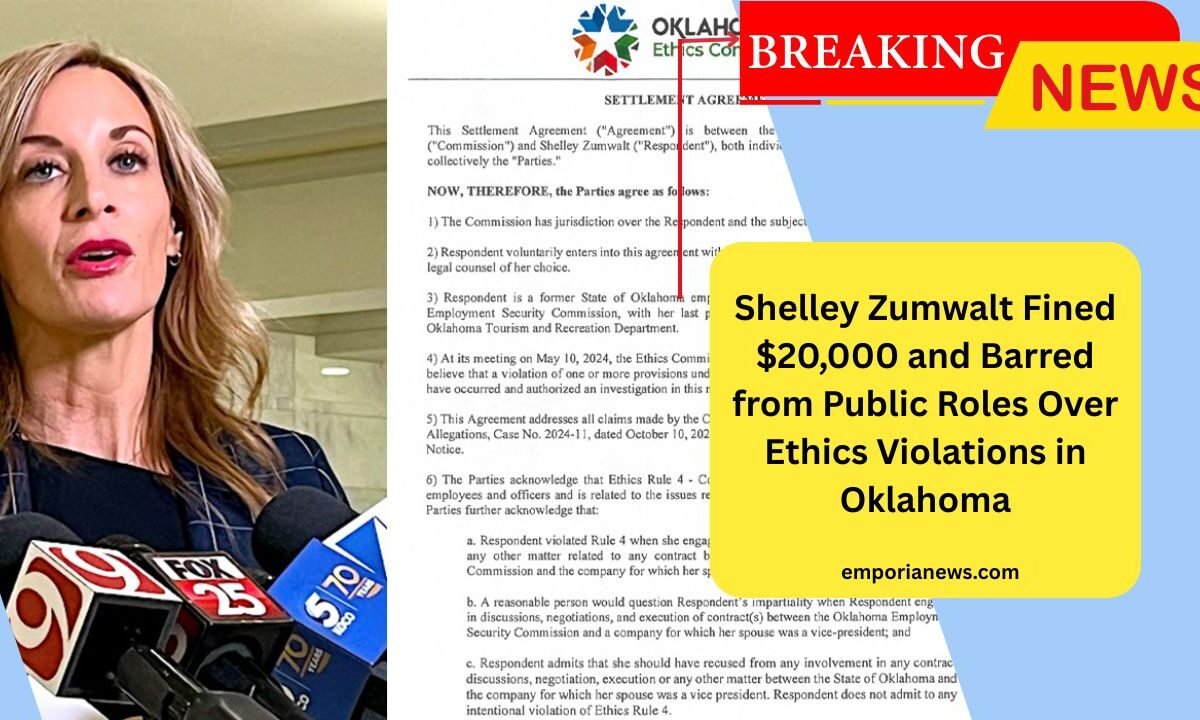Former Oklahoma Employment Security Commission (OESC) Executive Director Shelley Zumwalt has entered into a formal settlement with the Oklahoma Ethics Commission, agreeing to pay a $20,000 fine and accept a two-year ban from holding any public position in the state.
The action stems from a conflict of interest related to her role in approving contracts that involved her husband’s employer during her tenure at OESC.
This resolution follows an extensive investigation conducted by the Ethics Commission staff in conjunction with the Oklahoma Attorney General’s Office. The agreement was finalized and made public on Monday, marking the conclusion of the long-standing ethics inquiry.
Key Terms of the Agreement
According to the settlement, Shelley Zumwalt must:
- Pay a $20,000 civil penalty to Oklahoma’s General Revenue Fund by August 9.
- Not hold any public office in Oklahoma for two years.
- Avoid seeking or accepting any position (elected or otherwise) that involves state-funded compensation.
- Refrain from acting as a paid consultant for any state agency, board, department, or commission.
- Cease paid lobbying activities within Oklahoma during the two-year period.
Lee Ann Bruce Boone, executive director of the Oklahoma Ethics Commission, emphasized the dual purpose of the penalties: “to promote accountability and deter future violations.”
Background: Conflict of Interest Involving Spouse’s Employment
The ethics violation is rooted in a conflict of interest linked to Zumwalt’s approval of contracts involving Phase 2 Development, a company where her husband was employed.
Approximately two months before her appointment, OESC signed a software redevelopment contract with the firm.
Despite her husband’s employment with Phase 2, Zumwalt failed to disclose this connection in her annual ethics affidavits — a requirement under federal guidelines for recipients of grant funding.
The issue came to light following a 2022 federal audit, the results of which were released in April 2024. The audit criticized Zumwalt for omitting her husband’s employer in key documentation, even though she continued to authorize contract renewals and amendments involving Phase 2 Development.
According to State Auditor and Inspector Cindy Byrd, “Federal law mandates written disclosure of any conflict of interest for entities receiving federal grant money.
Individuals with personal or financial ties must not participate in contract-related decisions.”
Zumwalt’s Role During the Pandemic
Zumwalt was appointed by Governor Kevin Stitt to lead the OESC during the height of the COVID-19 pandemic, a time when the agency faced immense pressure and a crashing unemployment claims system.
State legislators at the time had labeled the agency an “unmitigated disaster,” prompting the urgent need for leadership reform.
Despite being at the helm during one of the most challenging periods in OESC history, Zumwalt’s contract approvals involving her husband’s company have overshadowed her emergency leadership efforts.
Zumwalt Responds to the Settlement
In response to the finalized agreement, Zumwalt issued a statement reiterating her position:
“I want to acknowledge the collaborative efforts of the Oklahoma Ethics Commission and Attorney General’s Office to achieve this outcome. Neither my husband nor I financially benefited from the contracts, and there was no finding by the Ethics Commission of any financial gain.”
Zumwalt declined to make further comments and deferred to the official statement she had released on Thursday, after the Commission’s vote.
Political Implications and Ongoing Legal Disputes
The agreement may also put to rest speculation about Zumwalt’s rumored interest in a 2026 run for lieutenant governor, a race where Cindy Byrd has already announced her candidacy.
In January 2024, Governor Stitt had appointed Zumwalt as the Secretary of Tourism, a move that later became part of a broader legal dispute.
Zumwalt remains a plaintiff in an ongoing lawsuit questioning whether a person can simultaneously serve as a state agency director and a Cabinet secretary. The case has reached the Oklahoma Supreme Court, where oral arguments were recently heard.
The settlement between Shelley Zumwalt and the Oklahoma Ethics Commission marks a significant conclusion to a high-profile conflict-of-interest case involving the misuse of public trust during a time of crisis.
While Zumwalt maintains that no financial gain occurred, the imposed penalties and restrictions reflect the state’s firm stance on ethical transparency and public accountability.
Her two-year ban and $20,000 fine serve as a stark reminder to all public officials about the importance of proper disclosure and adherence to ethical codes.




